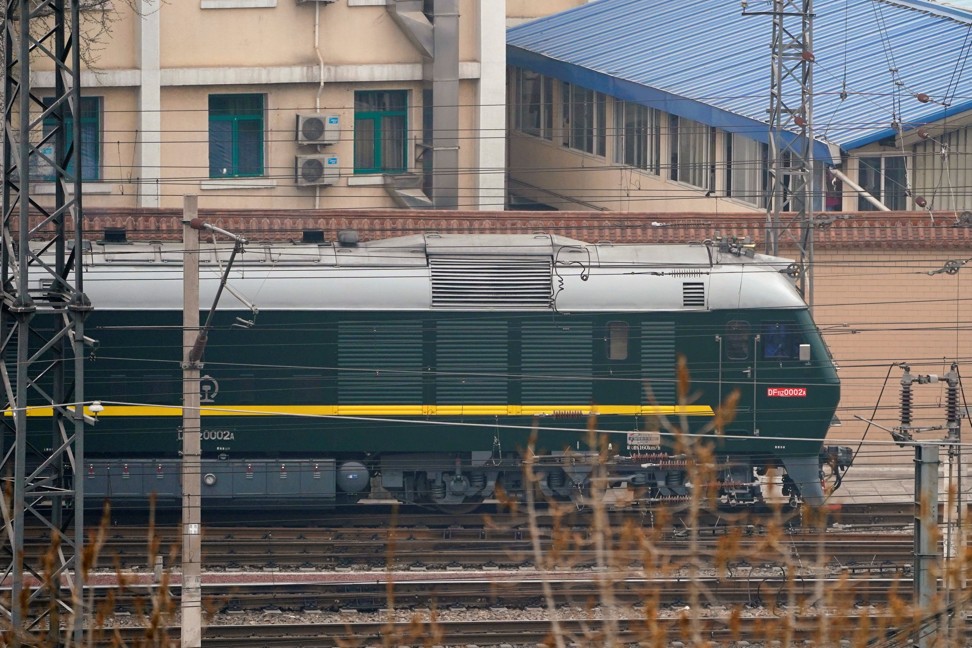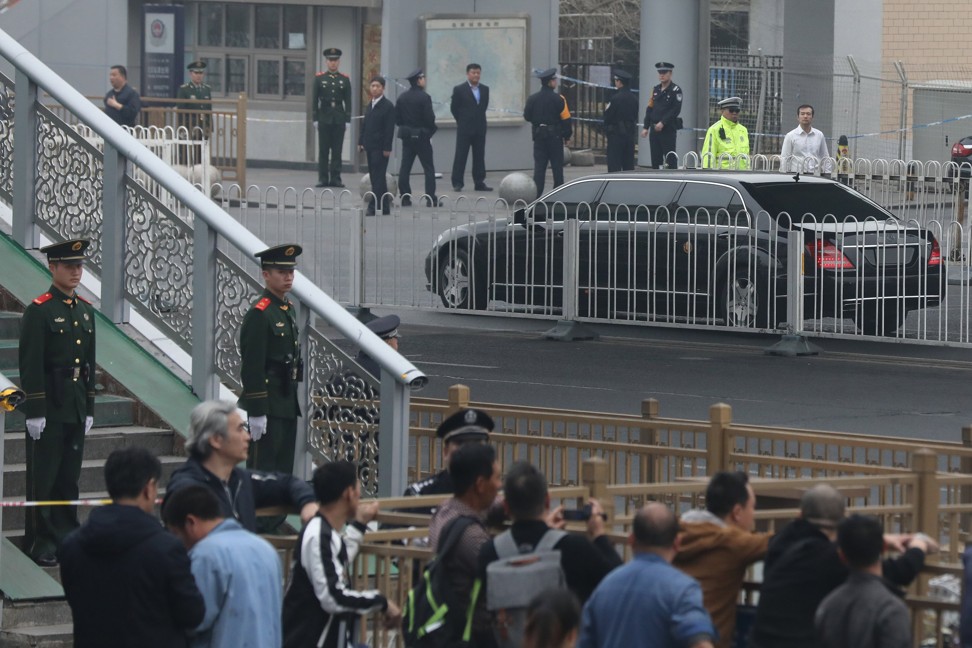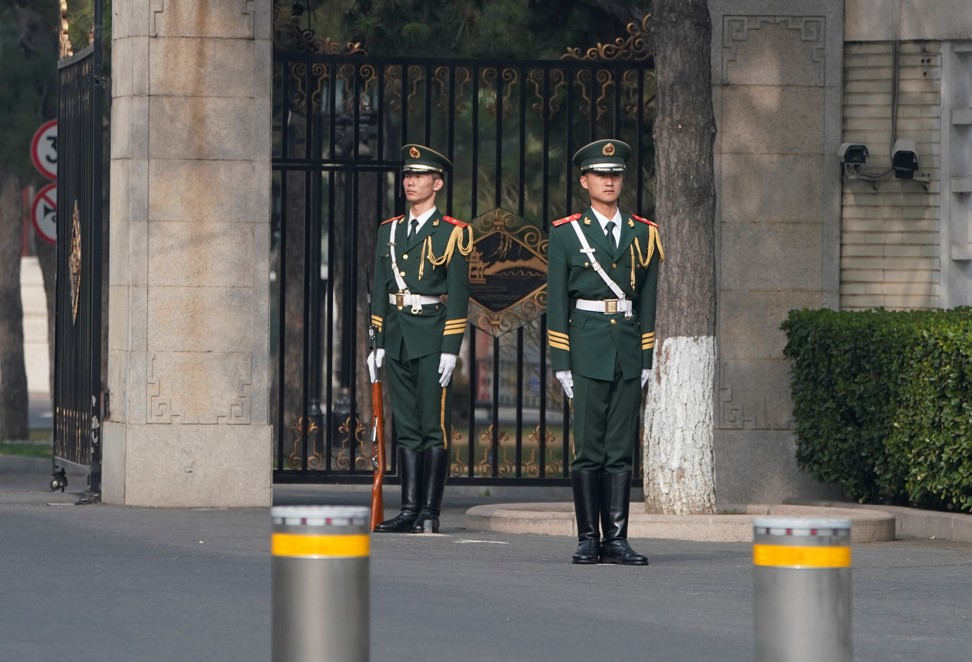
Rumours China and North Korea were no longer allies put to bed by Kim Jong-un’s Beijing visit
With crucial high-level talks with South Korea and the US looming, reclusive leader needed to know he still had a friend in Beijing
The visit by North Korean leader Kim Jong-un to China sent a clear message to the world that despite rumours to the contrary, Beijing and Pyongyang remain close allies, analysts said on Tuesday.
The visit was Kim’s first trip to a foreign country since succeeding his father, Kim Jong-il, as supreme leader of North Korea in December 2011.
It came just days before a planned meeting with South Korean President Moon Jae-in and ahead of a possible summit with US President Donald Trump.
Kim met with Chinese President Xi Jinping and other top Communist Party leaders, including Premier Li Keqiang.
The massive police presence on Monday and Tuesday around Beijing railway station and the Diaoyutai State Guesthouse, which is used to host foreign dignitaries and where Kim’s late father stayed seven times between 1994 and 2011, was impossible to miss.
Bates Gill, a professor of Asia-Pacific strategic studies at Macquarie University in Sydney, said that if Kim had visited Beijing, it signalled his desire to have China on side before his talks with Moon and Trump.
“The mere fact that he’s there – if he’s there – and has meetings with Xi Jinping in itself is just, from the optics, a very powerful signal to Moon and to Trump about the apparent willingness of China to offer up some kind of at least political support,” he said.
“[Kim] understands that going into these very high-powered strategic meetings, he needs all the friends he can get, or at least the image that he has as many friends that he can get.”
Beijing-based military expert Zhou Chenming said that the surprise visit was also aimed at rebutting widespread claims that China, which remains North Korea’s biggest diplomatic and economic supporter, no longer had any leverage over its reclusive neighbour.
“The visit itself is proof that Beijing and Pyongyang have maintained their traditional friendship and top-level contacts despite rampant rumours about their ties being strained,” he said.
By choosing Beijing as the destination for his first overseas trip, the despotic Kim was also clearly trying to make a conciliatory gesture and assure Xi that he had no intention of forging closer ties with Washington at the expense of Sino-North Korean relations, Zhou said.
The fact the two leaders had failed to meet in person had often been used as evidence of deteriorating ties between the two countries, which had been tested still further as Pyongyang had accelerated its nuclear weapons programme in recent years, he said.
Amid mounting international pressure and its apparent discontent with the unruly Kim, under whose leadership North Korea has carried out four nuclear tests and more than 80 missile launches, Beijing has edged closer to Washington with its support for a series of UN sanctions against Pyongyang.
“Kim has apparently felt the heat of heightened economic sanctions and is desperate to take proactive steps to ensure the survival of his regime and avoid the collapse of his starving, destitute country,” Zhou said.
However, it was also possible that Kim, being keenly aware of the escalating tensions and possible trade war between China and the US, wanted to take advantage of the situation and advance his own interests by playing the China card ahead of his proposed meeting with Trump, he said.
Another Beijing-based expert, who spoke on condition of anonymity, said that Beijing shared Pyongyang’s desire to protect the North Korean regime, as its collapse would compromise its own border security and provide an excuse for the US to stage a military intervention.
“While Kim, who clearly has no intention to give up his nuclear arsenal as Washington has requested, badly needs Beijing’s political and security assurances, China, which has been the main supplier of food and oil to Pyongyang, would still love to play the North Korean card in dealing with Trump’s White House,” the person said.
Euan Graham, director of the international security programme at Australia’s Lowy Institute, said it was understandable that North Korea would want to make sure China had its back going into the high-stakes meeting with Trump, particularly after the recent appointment of foreign policy hawk John Bolton as US national security adviser.
“It’s rather an expedient interest that North Korea wants to make sure it won’t be outflanked by a US-China deal ahead of that Trump-Kim summit, and that it has a great power and ally on its border that the US will have to consider, if it goes down the military route,” he said.
Benoit Hardy-Chartrand, a lecturer at the University of Montreal, agreed that it was in both China’s and North Korea’s interests to work together ahead of Kim’s meetings with Moon and Trump.
Kim would likely want to ease tensions with China, and might even ask Beijing to make some concessions and relieve some of its pressure on North Korea, as “in 2017, for the very first time, China has really tightened the screws on North Korea in a rigorous fashion … and that’s started to hurt the North Korean regime”, he said.
Kim might also have asked for Chinese backing on specific requests Pyongyang wanted to make to the US, such as reducing the number of American troops in South Korea, Hardy-Chartrand said.
Such requests would carry “a lot more weight” with the addition of Beijing’s support, he said.
For China, Kim’s visit would have helped to alleviate the frustrations it might have felt at being sidelined on the North Korea issue as a result of the planned talks with Moon and Trump.
“The stakes are just way too high for Beijing,” Hardy-Chartrand said. “Everyone wants to be a part of that game, now that Trump and Moon are going to meet Kim … Nobody wants to be left on the sidelines.”
While Kim might have hoped to get assurances of support from China in the wake of Trump’s repeated military threats, most observers said Beijing would be reluctant to offer any concrete commitments beyond expressions of political support, given the deep-rooted tensions between China and North Korea, and Kim’s own volatility.
“Although China does not support a military solution to the problems on the Korean Peninsula, Beijing is unlikely to offer outright security commitments or military support in case the US strikes Pyongyang for blatantly contravening UN sanctions,” Zhang Liangui, an expert from the Central Party School in Beijing, said.






